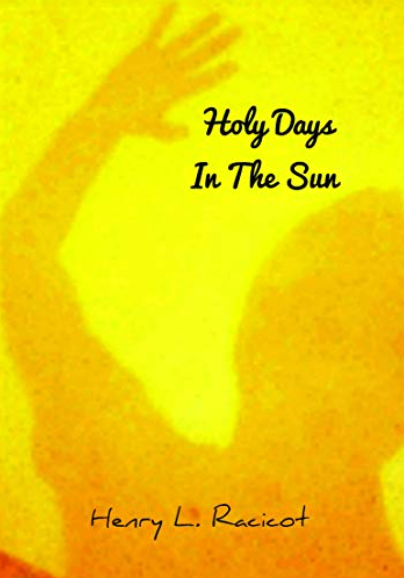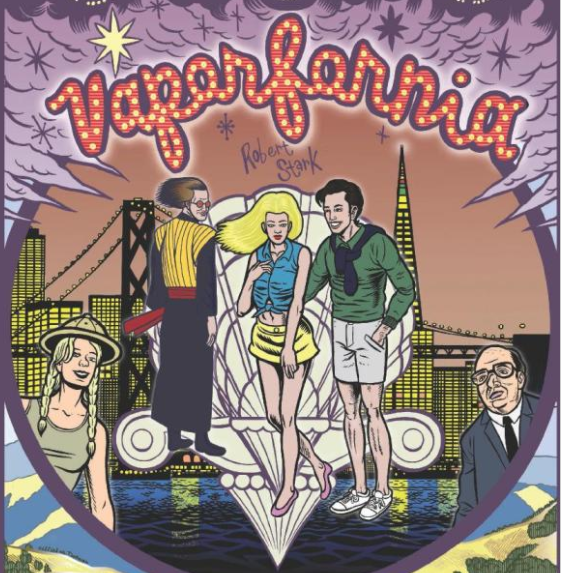A Christian Bukowski: Drunk on Disdain
Henry L. Racicot, whom I interviewed back in 2015 for
those interested in reading a more thorough introduction, blogs at Few There Be That Find It, where he holds forth on humanity’s failings and writes
ruminative zingers like, “Trump’s non-goodness is first readily evident in his
obesity, let alone any non-physical shortcomings”, and never hesitates to take
an unpopular position. (See, for instance, “Kyle Rittenhouse, Transgendarme”
and “Kyle Rittenhouse, Hero?”) Racicot is not a nationalist – in a 2009 post,
“Something to Be Thankful for on Thankstaking”, he even refers to “the devil’s
nationalism” – but he is a man who, through forces beyond the common man’s
control, finds himself marooned and alienated by the flow of history and at
odds with the prevailing fashions and plutocratic orthodoxies, which makes him
an oddball online neighbor of sorts. This year, Racicot published two
collections of short stories, and it is the first of these, Holy Days in the Sun, that I will be considering here.
The title establishes Racicot’s preoccupation with the
divine, but, in its allusion to the Sex Pistols song, also evokes the nihilism
of a materialistic world in which considerations of the holy seem quaint or even
bizarre. A few of the stories, like “The Three Wise Men” and “Denver Scramble” (which,
serendipitously, I happened to be reading on Thanksgiving), have holiday
settings, but a less forgiving reader might find in the title an advertisement
for a “cheap holiday in other people’s misery”, as Johnny Rotten put it. “I
haven’t smiled, except at the misfortune of others, in decades,” admits the
narrator of “The Unknown God”. Holy Days in the Sun is shot through with
misanthropy and smeared here and there with a mingling of sympathy and
contempt. “Growing up is a losing proposition,” he writes in one of my favorite
lines – a sentiment that captures much of the book’s sensibility. “Life is a
waiting room,” Racicot writes of the futility of man’s endeavors: “A waiting
room for death” – and, appropriately enough, several of his scenarios involve
waiting: waiting for a bus, sitting in a clinic’s waiting room to get tested
for herpes, or waiting in the customer lounge of an auto repair shop. “Me? I’m
in a ditch by the side of the road,” he muses. “Nothing to do but wait. That’s
the test of faith. To resist trying to save myself, and to wait for Jesus to
pull me out at the End of Time …”
As an atheist of pagan and Promethean affinities, I
find the author’s Christian resignation to be rather foreign and uninspiring.
Faith mostly furnishes a background to the goings-on, and the book tends to
become more annoying as its theological concerns creep to the fore. “Snake eyes
from Eden on. Born to lose,” Racicot writes in one of Holy Days in the Sun’s
less subtle passages. “How Jesus would have gathered them, but they would not!
The great kill themselves, the poor offer their livelihood to the unknown god,
hoping for their miracle when the slot machines are troubled like the waters at
the pool of Bethesda.” Another example of Racicot’s writing at its most
explicitly religious and therefore least engaging is this passage that opens
“The Captive”:
Hours turn into days, and
days turn into weeks, and I notice nothing. I don’t even see myself, anymore. I
am no longer apart. The waves of life carry me toward the shores of death. I no
longer refuse. I perform the motions of life: family, work, state, but because
I no longer seek another way, I drown in the sea of nothingness. The pantomime
existence of the masses. Vast eons of life passed this way, with the unthinking
multitude, the daily suicide shirking the responsibility of life, which is to
remove oneself from the counterfeit of the world, and seek the Kingdom.
No fewer than seven occurrences of the word “I” from a
character who claims no longer to notice himself! This paragraph, one of the
book’s worst, is, however, followed by some of Racicot’s best:
Only the shock of tragedy
jolts me from the stupor. My latest fall into the sleep of the living dead was
arrested as I was walking down Main Street and observed a fat woman training a
dog to become a Seeing Eye. What horror! The poor beast leashed to the human
gob, its neck yanked, choked, every time it tried to seek its way. The dog’s
will destined to be broken, it will submit to an unworthy master. I immediately
recognized myself in the dog, regained my senses and vomited right there on the
sidewalk from the sickness of everyday life.
He then launches into descriptions of his experiences
in art museums:
I’ve frequented museums
all across the United States and Europe, and even though most works housed in
them are worthless – imbecilic portrayals of Mary and Jesus, technically fine
but thematically somnolent studies of bowls of fruit, incompetent
nonrepresentational stains – the diligent patron will always find three or four
pieces which accuse and convict humanity of auto-lobotomy. These rare treasures
exaggerate human experience, exposing the sad sell-out of the peasant and
lumpenproletariat classes, ancient to contemporary.
His irreverent catalogue of “the usual dreck, Monet’s
water lilies – the perfect packaging for air fresheners … busted Roman
sculptures – tiny-cocked nudes missing a limb or two, lacking the wit even of a
garden gnome … Rothko’s honestly titled Untitled – a red rectangle
between two black rectangles, quintessential usury art,” can be both spot-on
and hilariously unfair.
As the reference to “usury art” indicates, Racicot is
aware of Jews, who show up in more than one of the stories, not always in a
favorable light. In “The Eleventh Step”, for example, a know-it-all Jew named
Ira takes offense at the presence of a Christmas tree at an AA-type meeting and
also objects when somebody speaks out of turn that “the protocols forbid cross
talk” at their gatherings. My favorite story, “The Three Wise Men”, in which
the protagonist’s two young sons frolic through a shopping mall on their way to
a coin-operated ride, contains this humorous moment:
“Time for a cookie,
Michael. Say ‘merry Christmas’ to the nice girls, then follow me and your
brother.”
“Merry Christmas!”
Michael says.
“We’re Jewish. We don’t
deserve Christmas,” the girl at the steering wheel says.
The mother looks
horrified.
“OBSERVE, Rachel! ‘We
don’t observe Christmas!’”
Blacks also appear in the book; and, given Racicot’s
exposure to them through the criminal justice system, they come across
believably enough. Take, for instance, the reaction of some jail inmates to the
clumsy attempt of one of their subnormal fellows to escape detention:
Some of the inmates laugh
at the spectacle.
“That silly ass nigger
ain’t got no pride,” one says with great scorn.
“Pride ain’t got nuttin
to do wit it,” another says wearily. “He a retard. He as dumb as you, nigga.”
As condescending as some of the author’s characterizations
are, readers are never encouraged to see one ethnic group or class of people as
better than any other. “Human decency,” he scoffs. “Human and decency go
together like oil and water.” Racicot has contempt for us all: “It’s from this
jail I see the absolute worthlessness of human nature, and the absolute lack of
faith,” he confesses in this typical statement of his relativism:
I’m grateful to God to
have worked a year in here. It’s now crystal clear everybody in the world is on
the wrong path.
The only difference
between the people in jail and the people on the outside is clumsiness. These
people, the inmates, are klutzes. They stumble more, they crash into things and
draw attention to themselves. Losers. But they’re just caricatures of the
so-called successful. They view life the same as the rest, including the
Sunday morning pew-warmers. They think there is something to get out of this
world … but there’s nothing to get out of the world … except their souls.
Whatever the reader’s spiritual perspective, Racicot’s
sketches of urban squalor probably will ring true for inhabitants of any of
America’s wasted metropolises:
I’ve driven down this
street thousands of times. A typical ugly American street. Mile after mile
after mile, littered with retarded businesses. […]
As I get into the city,
the shops are boarded up. The survivors cater to the basics. Tire store.
Liquor. Collision shop. Not many people on the street. […] The few shuffle
along, wiping their noses and looking in garbage cans.
“You know you are awake when you are filled with
disgust,” he writes elsewhere – and it is these moments of identity in
revulsion that constitute the book’s unexpected saving grace, as when he weighs
the merits of “that cocksucker Stephen Hawking. I always hated his ugly mug and
his ugly thoughts,” Racicot spits in “The Last Supper”: “Master of the
Universe! What makes me bitter is that he would be considered better
than the [vagrant] guy sitting next to me.” He can be particularly brutal in
his descriptions of women, as in “Living Bodies”:
Everything dies,
including beauty. Sin alters brain chemistry, sin engineers genetic mutations,
etc., etc. Thousands and thousands of years of human sin, the human body
marred. I mean, look at that lizard sitting over there. Forty and her face
rough as sandpaper. When Eve was three hundred she probably looked twenty years
younger than this bag, with her straw hair. Look at her, her mouth hanging open
while she stares at the television, her gray teeth pointing every which way.
Listen, if this crocodile were the one who offered Adam fruit from the tree of
the knowledge of good and evil, we’d all be fine today …
In “Denver Scramble”, he diagnoses another unappealing
woman’s “McBreakdown”, Americans’ superficiality and spoiled desire for quick, junk
solutions to their problems predisposing them to the occasional “drive-thru
emotional crisis”. Sometimes, though, as in “Knock, and It Shall Be Opened”,
such unappetizing specimens of womanhood are the only ones who may be
sexually available: “This is my first close-up look at her. She has a little
whitehead at the corner of her nose. It’s depressing,” she prompts him to
ponder more broadly: “We’re all just pimples on existence.” Suffice it to say
that this is unlikely to be a selection for Oprah’s Book Club anytime soon.
Holy Days in the Sun
is a work of devotion, but not “inspirational fiction”, nor is Racicot likely
to land a book deal with Christian publisher Zondervan – not that he would seek
such a dubious distinction. This is a mostly morbid book, with precious few lighthearted
or conventionally redeeming moments, so that Racicot’s last-page recommendation
to “Be of good cheer!” comes across as sarcasm more than anything else. Two or
three (more than usually) disturbing passages in the stories even had me
wondering if the author is mentally ill – which I can only assume he would
readily confess. At any rate, the man earns a pat on the back if only for
having thought up stunning pieces of dialogue like, “I pray God bless you with
the HIV virus, that you may come to know our Great Physician!” This would
probably be a good Christmas gift to give to boring, unlikable Christian
relatives, actually – just to freak them out.
Rainer Chlodwig von K.
Rainer is the author of Drugs, Jungles, and Jingoism.




Comments
Post a Comment